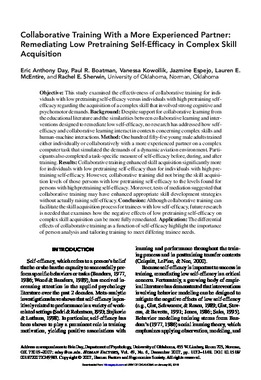| dc.contributor.author | Eric Anthony Day | |
| dc.contributor.author | Paul R. Boatman | |
| dc.contributor.author | Vanessa Kowollik | |
| dc.contributor.author | Jazmine Espejo | |
| dc.contributor.author | Lauren E. McEntire | |
| dc.contributor.author | Rachel E. Sherwin | |
| dc.date.accessioned | 2016-01-14T19:53:56Z | |
| dc.date.accessioned | 2016-03-30T15:31:31Z | |
| dc.date.available | 2016-01-14T19:53:56Z | |
| dc.date.available | 2016-03-30T15:31:31Z | |
| dc.date.issued | 2007-12-01 | |
| dc.identifier.citation | Day, E. A., Boatman, P. R., Kowollik, V., Espejo, J., McEntire, L. E., & Sherwin, R. E. (2007). Collaborative Training With a More Experienced Partner: Remediating Low Pretraining Self-Efficacy in Complex Skill Acquisition. Human Factors: The Journal of the Human Factors and Ergonomics Society, 49(6), 1132-1148. doi: 10.1518/001872007x249983 | en_US |
| dc.identifier.uri | https://hdl.handle.net/11244/25533 | |
| dc.description.abstract | Objective: This study examined the effectiveness of collaborative training for individuals with low pretraining self-efficacy versus individuals with high pretraining selfefficacy regarding the acquisition of a complex skill that involved strong cognitive and psychomotor demands. Background: Despite support for collaborative learning from the educational literature and the similarities between collaborative learning and interventions designed to remediate low self-efficacy, no research has addressed how selfefficacy and collaborative learning interact in contexts concerning complex skills and human-machine interactions. Method: One hundred fifty-five young male adults trained either individually or collaboratively with a more experienced partner on a complex computer task that simulated the demands of a dynamic aviation environment. Participants also completed a task-specific measure of self-efficacy before, during, and after training. Results: Collaborative training enhanced skill acquisition significantly more for individuals with low pretraining self-efficacy than for individuals with high pretraining self-efficacy. However, collaborative training did not bring the skill acquisition levels of those persons with low pretraining self-efficacy to the levels found for persons with high pretraining self-efficacy. Moreover, tests of mediation suggested that collaborative training may have enhanced appropriate skill development strategies without actually raising self-efficacy. Conclusion: Although collaborative training can facilitate the skill acquisition process for trainees with low self-efficacy, future research is needed that examines how the negative effects of low pretraining self-efficacy on complex skill acquisition can be more fully remediated. Application: The differential effects of collaborative training as a function of self-efficacy highlight the importance of person analysis and tailoring training to meet differing trainee needs. | en_US |
| dc.language.iso | en_US | en_US |
| dc.publisher | Human Factors: The Journal of the Human Factors and Ergonomics Society | |
| dc.title | Collaborative Training With a More Experienced Partner: Remediating Low Pretraining Self-Efficacy in Complex Skill Acquisition | en_US |
| dc.type | Research Article | en_US |
| dc.description.peerreview | Yes | en_US |
| dc.description.peerreviewnotes | https://us.sagepub.com/en-us/nam/manuscript-submission-guidelines | en_US |
| dc.identifier.doi | 10.1518/001872007x249983 | en_US |
| dc.rights.requestable | false | en_US |
